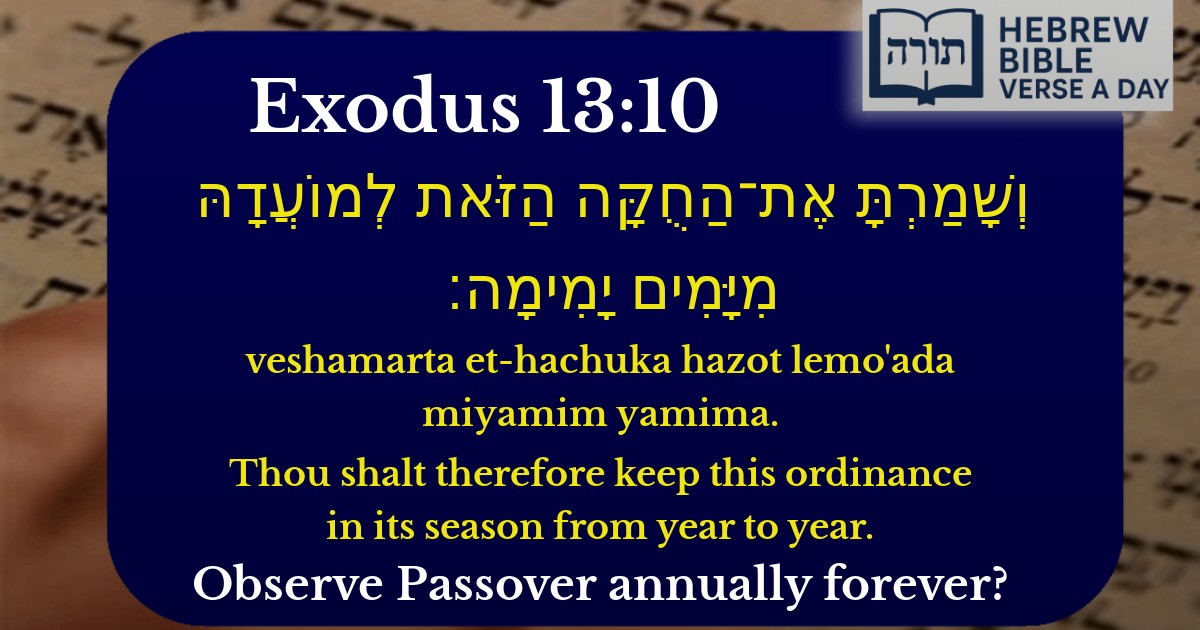Join Our Newsletter To Be Informed When New Videos Are Posted
Join the thousands of fellow Studends who rely on our videos to learn how to read the bible in Hebrew for free!
Hebrew Text
וְשָׁמַרְתָּ אֶת־הַחֻקָּה הַזֹּאת לְמוֹעֲדָהּ מִיָּמִים יָמִימָה׃
English Translation
Thou shalt therefore keep this ordinance in its season from year to year.
Transliteration
Veshamarta et-hachuka hazot lemo'ada miyamim yamima.
Hebrew Leining Text
וְשָׁמַרְתָּ֛ אֶת־הַחֻקָּ֥ה הַזֹּ֖את לְמוֹעֲדָ֑הּ מִיָּמִ֖ים יָמִֽימָה׃ <span class="mam-spi-pe">{פ}</span><br>
וְשָׁמַרְתָּ֛ אֶת־הַחֻקָּ֥ה הַזֹּ֖את לְמוֹעֲדָ֑הּ מִיָּמִ֖ים יָמִֽימָה׃ {פ}
🎵 Listen to leining
Parasha Commentary
📚 Talmud Citations
This verse is not quoted in the Talmud.


Context of the Verse
The verse "וְשָׁמַרְתָּ אֶת־הַחֻקָּה הַזֹּאת לְמוֹעֲדָהּ מִיָּמִים יָמִימָה" (Shemot 13:10) appears in the context of the mitzvah of observing the festival of Pesach (Passover) and the sanctification of the firstborn. It emphasizes the obligation to uphold this commandment annually, as part of the Jewish people's eternal covenant with Hashem.
Rashi's Explanation
Rashi (Rabbi Shlomo Yitzchaki) comments that the phrase "לְמוֹעֲדָהּ" ("in its season") teaches that the mitzvah must be performed at its designated time, even if that day falls on Shabbat. This principle is derived from the juxtaposition of this verse with the laws of Pesach, indicating that the korban Pesach (Passover sacrifice) overrides Shabbat when necessary.
Rambam's Perspective
In Mishneh Torah (Hilchot Korban Pesach 1:1), the Rambam (Maimonides) elaborates that this verse establishes the perpetual nature of the mitzvah, binding for all generations. He emphasizes that the observance is not contingent on the existence of the Beit HaMikdash (Temple); even in its absence, the laws of Pesach—such as the prohibition of chametz (leaven) and the retelling of the Exodus—remain in force.
Midrashic Interpretation
The Mechilta (a halachic Midrash on Shemot) connects this verse to the broader theme of zechirat yetziat Mitzrayim (remembering the Exodus). It teaches that the annual observance ensures the transmission of faith and gratitude to future generations, as the mitzvah is performed "from year to year" without interruption.
Key Halachic Principles